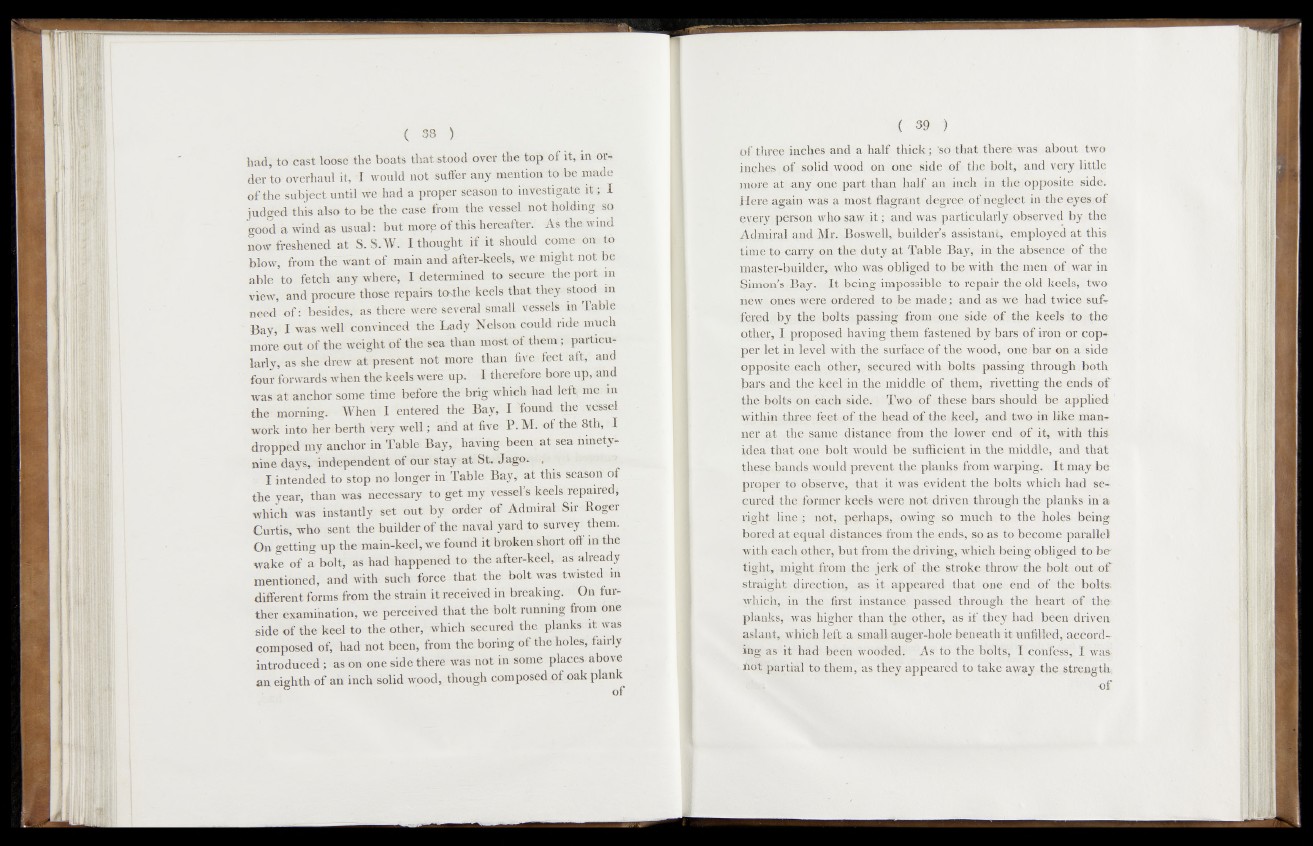
had, to cast loose the boats that stood over the top? of it, in or-*
der to overhaul it, Ï would not suffer any mention to be made
of the subject until we had a proper season to investigate it ; I
judged this also to be the case from the vessel not holding so
good a wind as usual : but morp of this hereafter. -As the wind
now freshened at s' S.W. I thought if it should come on to
blow, from thewvant of main and after-keels* we mighf riot be
able to fetch anywhere, 1 determined to secure the port in
view, and procure those repairs todhe keels that they stood in
need of: besides, as there were several small vessels in Tablé
Bay, I was well convinced the la d y Nelson could: ride much
more oat of the weight of the sea than most of them ; particularly,
as she drew a t present not more than five, feet ûffed and
four forwards when the keels were up* Ï therefore bore up, and
was at anchor some time before the brig which had left, me in
the morning; When I entered the Bay, I found the vessel
work into her berth very well ; and at five P. M. of the 8th, I
dropped my anchor in Table Bay,, having, been a t sea ninety^
nine d a y s , independent of our stay at St. Jago. , fc * ?
I intended to stop no longer in Table Bay, at this seasori of
the year, than was necessary to get my vessels keels repaired ;
which was instantly set out by order of Admiral Sit Roger
Curtis, who sent the builder of the naval yard to survey them.
On getting up the main-keel, we found it broken short off in the
wake of a bolt, as had happened.to the after-keel, as already
mentioned, and with such force that the bolt was twisted m
different forms from the strain it received in breaking. On further
examination, we perceived that the bolt running from one
side of the keel to the other, which secured the planks it was
composed of, had not been, from the boring of the botes, fairly
introduced ; as on one side there was not in some places above
an eighth of an inch solid wood, though composed of oak plank
of three inches and a half thick ; ’so tliat there was about two
inches of solid wood on one side of the bolt, and very little
more at- any one p a rttb a n h a lf an inch in theiopposite side;
Jle^.again was a most .flagrant degree; of neglect in the eyes of
pyery person who saw i t ; and was particularly observed by the
Admiral and Mri^oS'Wpll, buihjifs assistant, employed at this
time fo carry on the, duty at Table Bay, in the absence of the
master-builder, who was obliged to be with the men of , war in
Simon’s Bay. I t being impossibJerto repair the old keels, two
hew ones were ordered to be made;, and as we had twice suf*
fored by the passing from-one side of the keels to the
j proposed having them fastened by bars of iron or copf
per let in level with- the surface of the wood, one bar ©n a side
opposite each other, secured with bolts passing through.both
bars-and the keel in th em id d le p fth em , rivetting the ends o f
the bolts on eachside. | Two of these. bars should- be applied
within three feet p f the head of the keel, and two in like manner
at the same .distanee from the lower end o f it, with this
jdea that one' bolt. wbuld be.sufficient in the middtej and that
thejse bands would prevent the planks from warping, .-It may b e
pre^pef to o^erve,>that it.was#$id©nt the bolts which had ve-
cured the former keels wepe not driven through the planks in a
right lin e ; not, perhaps, owing s© much to the holes being
bared; at equal distances from the ends, so as to become parallel
with each#thser, but from the driving, whieh being obliged to b e
tight, might, from the jerk of the stroke throw the bolt out o f
straight -dkectiien, as it appeared that one epd of the bolts;
which, in the first. instance passed through the heart -of the
planks, was higher than the other, as if they had been driven
aslant, which left a small auger-hole beneatbit unfiMed:, aec©rd-r
iiig as it had been wooded. As to the bplts, I confess,. I was
dot partial to them, as they appeared to take away the strength
' ■ o f